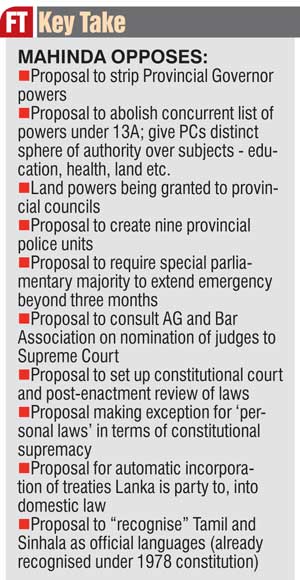Saturday Feb 21, 2026
Saturday Feb 21, 2026
Monday, 5 December 2016 00:10 - - {{hitsCtrl.values.hits}}
By Dharisha Bastians
 Former President and Kurunegala District MP Mahinda Rajapaksa fired his first major salvo against the proposed new Constitution yesterday, saying that by rushing through the constitutional reform process, the Government was prioritising matters that were ‘only of interest’ to “separatists” and “foreign parties”.
Former President and Kurunegala District MP Mahinda Rajapaksa fired his first major salvo against the proposed new Constitution yesterday, saying that by rushing through the constitutional reform process, the Government was prioritising matters that were ‘only of interest’ to “separatists” and “foreign parties”.
Taking blatantly Sinhala nationalist positions in a lengthy essay released by his office, Rajapaksa puts forward 10 points of opposition to proposals – especially regarding devolution of power – made by six sub-committees set up to go into specific areas of the new Constitution.
“None of the recommendations listed above should be in the final draft of the constitution,” Rajapaksa’s statement said. The former President charged that the new Constitution would divide the country without specifically using the word “division”.
The opposition comes only days after President Maithripala Sirisena slammed political forces led by Rajapaksa, who he claimed were deliberately misleading people to sabotage the Government’s efforts to achieve national reconciliation and deliver a permanent political solution to end decades of ethnic strife.
But Rajapaksa slammed President Sirisena, saying he had chosen to make a case for devolution of power in Parliament while the country was facing major strikes and protests against the Government’s budget proposals.
Predictably, the former President opposes proposals made by subcommittees on centre-periphery matters – specifically related to the devolution of powers and the granting of greater political autonomy to the provinces – including reduced powers to provincial governors and land powers being granted to provincial councils.
He also opposes the abolition of the concurrent list, a provision of the 13th Amendment that allows the central Government to retain overarching powers over all subjects devolved to the provincial councils. The former President also opposes recommendations to consult the Attorney General and the Bar Association of Sri Lanka in the nomination of Supreme Court judges and the requirement for a special parliamentary majority to extend the state of emergency beyond three months within a single 180 day period.
But the most controversial point on Rajapaksa’s list was his opposition to Sinhala and Tamil being recognised as the official languages of Sri Lanka, even though both languages have already been granted the official status under the current constitution.
The former President also appeared to make a case for provisions of the controversial 1956 Sinhala Only Act - which is widely believed to have exacerbated ethnic tensions and proved strongly discriminatory towards the Tamil minority - noting that S. W. R. D. Bandaranaike had applied the same principle with Sinhala as the official language and reasonable provision for the use of Tamil especially in the north and east. “These are arrangements that should not be disturbed with ill-advised experiments,” the former President warns in his statement.
Critics say these remarks are deliberately misleading, because both Sinhala and Tamil are already recognised as official languages of Sri Lanka in Chapter IV of the 1978 Constitution. The recommendation of the sub-committee makes no significant change to this policy.
Speaking to Daily FT, Luwie Ganeshathasan an attorney and researcher at the Centre for Policy Alternatives said the former President’s statement contained several half-truths and inaccuracies.
Rajapaksa’s statement about language rights was particularly worrying, he said.
“It seems to be in ignorance of Article 18, 19 and 22 of the Constitution which recognises both Sinhala and Tamil as the official and national languages of Sri Lanka. This position has been repeatedly upheld by the Supreme Court, including most recently in the FR case on the national anthem,” the CPA researcher noted.
He added that the statement also contradicted the former President’s stated support for a “Trilingual Sri Lanka”, a policy towards which he as President and Finance Minister appropriated considerable public money. “Either Mr. Rajapaksa was disingenuous about his stated support for the language policy when he was President (which could explain its poor implementation) or he is deliberately trying to create new issues,” Ganeshathasan added.
During his presidency, Mahidna Rajapaksa launched a 10 year program for a Trilingual Sri Lanka and declared 2012 the ‘Year of trilingual Sri Lanka’. His recent statement marks a departure from that policy.
The former President’s only single input that is considered progressive is his opposition to exceptions being granted to Personal Laws, such as the Muslim Marriage and Divorce Act (MMDA) in the fundamental rights recommendations for the new constitution. The exception, endorsed only by fundamental rights sub-committee member M. H. M. Salman of the Sri Lanka Muslim Congress, would allow personal laws to be upheld even when certain provisions of those laws are inconsistent with the new constitution.